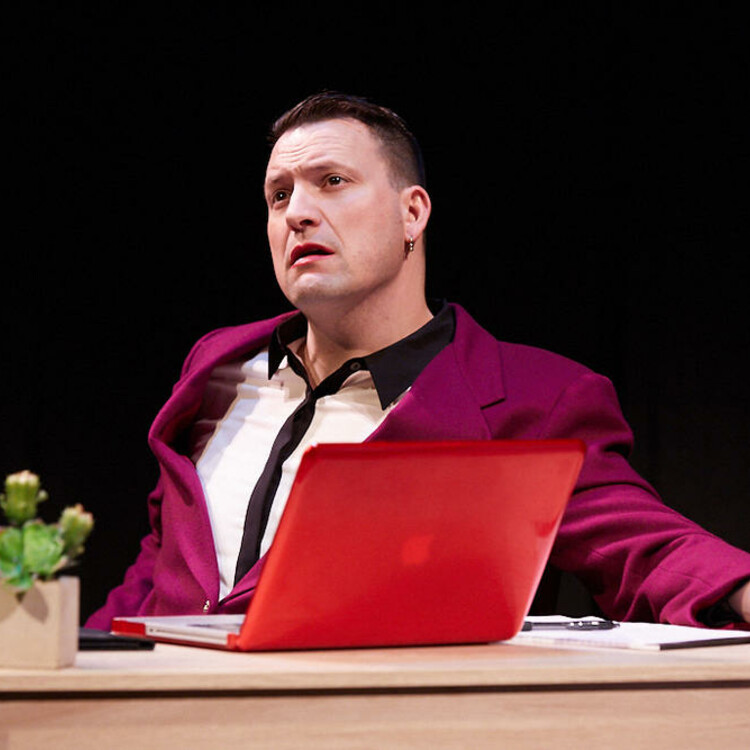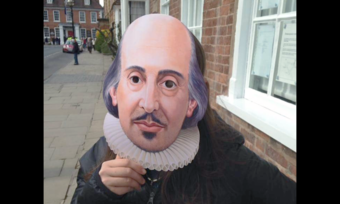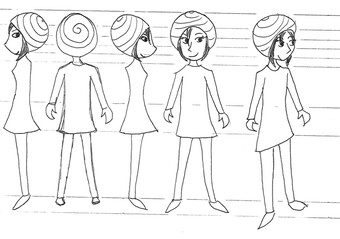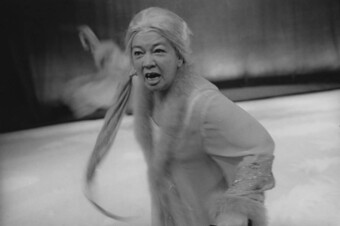The Gift of Shakespeare
In 1985, my mother gave me what was perhaps the best gift anyone has ever given me. She took me to see A Midsummer Night's Dream. I was a fairly typical five year-old who was obsessed with He-Man and Star Wars. I dealt with normal little kid problems—grappling with ADHD, and simultaneously worshipping and hating my big brother, who was two years older than me.
My mom was a double major in English and Theatre at the University of North Alabama at the time. She had to pry my brother and I away from our action figures and drag us to the Norton Auditorium at UNA to see Alabama Shakespeare Festival's touring production. It blew our minds.
Memory is funny, and now all I can really remember from that production is the mechanicals’ re-enactment of the Pyramus and Thisbe love story in the play within a play; and Oberon and Puck putting on sunglasses whenever they turned invisible. For months, my brother and I replayed the hilarity of Thisbe's suicide in ASF’s production. We also frequently pretended to be Oberon and Puck as we snuck around our neighborhood.
Since that first experience, I have had an embarrassment of riches interacting with the Bard. He's my favorite poet and playwright. Which is why I'm delighted to hear about Oregon Shakespeare Festival's much debated "translations" of Shakespeare's plays.
New City, New Theatres
When I was ten, my family moved to Louisville, Kentucky. Previously, Paducah, Kentucky, had been the biggest town I had lived in. It had a building ten stories tall! So, Louisville was a big step up. It was also a big step up in terms of access to theatre. My mom started teaching theatre at the local performing arts high school, and my dad built sets for several of the professional companies in town, including the Kentucky Shakespeare Festival, nestled in the heart of urban Louisville and right in Central Park.
The summer I was eleven, KSF produced The Merry Wives of Windsor and they wanted to cast a kid as Robin, the page who ferries notes back and forth between the titular wives and the buffoonish villain Falstaff. I got the part. Maybe it was my stunning array of talent and charm, or maybe it was the fact that my dad was an employee at KSF; they figured he'd make sure I showed up on time to rehearsal.
Either way, I was immersed in Shakespeare for two months, and everyone was amazing. Actors took time to explain lines, teach me new words, and point out all the dick jokes I was missing. I heard all the notes the director gave to help the actors make the meaning of each line clear with gesture, tone, and intention.
The actress playing Mistress Page sat down and narrated Henry IV, Parts I and II, as well as Henry V because I had no idea who Falstaff was. My mom also made sure to explain that it was King James' love of Falstaff that encouraged Shakespeare to resurrect a character he killed in a previous play. I learned so much.
A year later, my family moved to the Old Louisville neighborhood, about two blocks away from Central Park. Throughout my middle school and high school years, all I had to do was walk two blocks over to observe KSF rehearsals, and start learning again. I would then wander over a few nights later to get a seat at the productions, which are, miraculously, still free and un-ticketed.
Some people get excited about the first Christmas decoration they see every year, but I get excited about the first tell tale signs that KSF has returned to Central Park for another summer. Over the years I've seen dozens of free productions at KSF. I've seen the Bard in production elsewhere at college, and at a variety of high schools, including the performing arts high school I attended. I've also had the chance to perform in a few of Shakespeare's works and choreograph a production of Taming of the Shrew set in the 1920's.
For far too many people, their lack of exposure to Shakespeare’s work is due to time, money, and access.
The Embarrassment of Riches
But it all goes back to that first production of A Midsummer Night's Dream. That's when it started. What if my mom had been too tired to take us to that show? What if she'd been too broke to enroll in college at UNA? What if she had desperately been hoping to introduce us to the Bard, but had been working a second job, and couldn't get off work on that fateful night?
The language centers of my brain were literally still forming and moving around in my thick little skull the first time I was given the gift of Shakespeare, and it changed everything for me. But there are a hundred ways I could have missed out, and almost all of those reasons boil down to time and money.
Despite the valiant efforts of theatre companies like Alabama Shakespeare Festival, Kentucky Shakespeare Festival, and Oregon Shakespeare Festival, there is still an ocean of students who don't get exposed to Shakespeare until they are much older. Shakespeare’s language—that beautiful, unparalleled, amazing language—becomes a barrier instead of a gift. For far too many people, their lack of exposure to Shakespeare’s work is due to time, money, and access.
I love Shakespeare, and I will always personally prefer the unadulterated version of his words. Let's be clear: I don't claim to speak Elizabethan English fluently. There are still words I puzzle over, and phrases I work through. But I was taught to love this process and value Shakespeare’s words by a host of people who shared that love, starting with my mother. This experience leads right up to today. Any Bardophile in Louisville can walk up to Matt Wallace, the Artistic Director of Kentucky Shakespeare Festival, and chat with him as he stands at the back of every single performance of KSF's ten-week summer season.
So, here's my question to all the people who counterfeit to swoon when they hear about the "translations" at OSF: who gave you the gift of Shakespeare? And why would you discourage passing on this gift, even if it is in a different form than when you first received it?
Special thanks to Katie Perkowski of Alabama Shakespeare Festival and Rob Silverthorn, III of Kentucky Shakespeare Festival. They both dug through their organizations' production archives for this article.








Comments
The article is just the start of the conversation—we want to know what you think about this subject, too! HowlRound is a space for knowledge-sharing, and we welcome spirited, thoughtful, and on-topic dialogue. Find our full comments policy here
Each summer, Chicago Shakespeare Festival takes their abridged versions of Shakespeare productions to the public parks of culturally underserved neighborhoods and presents them for free to anyone who wants to come. These audiences are full of children and young people, and many of them are seeing a production of Shakespeare for the very first time. The children are always spellbound by the productions.
These are abridged (shortened to 90 minutes) but not translated productions. They are designed as a "first glimpse" of Shakespeare and the audiences (especially the children) love them. These children are experiencing their first Shakespeare in the way that Shakespeare was meant to be experienced: in performance.
The problem with the idea of these new translations is that they seem to be geared primarily towards the challenge of reading Shakespeare, which is the wrong way to interface with Shakespeare for the first time. Shakespeare's plays weren't written to be "understood." They were written to be experienced.
For some reason, it is so easy for us to forget that William Shakespeare was simply a man who wrote plays. Plays are to be performed in front of an audience. Plays are not literary experiences. Reading a play is simply the very first step in a very long process of bringing a very complex performance to life on the stage. Plays are blueprints for productions, and reading a Shakespeare script with the goal of "understanding" and "meaning" is fruitless and misses the point of playmaking entirely. I'd wager that a great number of young minds have been soured on Shakespeare for this very reason.
The great truth about Shakespeare (and any other play for that matter) is that a play is written to be performed and comes to life in the "translation" of performance. If a production is clear, and the actor knows what he is saying, so will the audience. The "understanding" of Shakespeare comes from that magical exchange of information and energy between a generous, well-prepared cast and the capable imagination of the audience. Shakespeare's plays were written with that relationship in mind. Shakespeare understood the spell that playmaking weaves over an audience. He mastered image and metaphor as imaginative tools to make something mysterious and complex come to life directly in the minds of his audience. And that mysterious thing was delivered to the audience's imagination through the mouth of the actor on a stage, not through a line on a page.
The only "translation" that Shakespeare needs is from the classroom to the stage.
My daughter saw her first Midsummer at age 4 at The Mount, and she made us stay another night to see the play again, magically outside. She has never needed a "translation" which I find a heinous idea and I bet Shakespeare would agree. What is needed is Better acting and direction that pays attention to the feeling in the language, and to conveying the emotional line. And, what is needed is more exposure to nature, to actual lived time in the natural world, even if a city park or an encounter with a squirrel. Shakespeare is in large percent nature imagery. He knew as we need to rediscover that the natural world is a mirror of the inner unconscious life--and that creativity is intimately bound up with and reliant upon nature. Instead of changing Shakespeare, we should be producing, what the OSF will NOT do nor will virtually any regional theater in the U.S. because they are afraid of alienating their fossil fuel invested funders, plays that address climate change and encourage our love of nature. We need an open and honest discussion of financial censorship and how that is undermining culture, and even human survival, but instead, we get foolishness about adapting Shakespeare. I teach inner city college students. They can understand feeling far better than most people. They love language, story and they also understand climate science and its relationship to racial justice.
I am of two minds about the "translations". First, I can't understand why the hissy fits have commenced now. Adaptations of Shakespeare are nothing new. If we're going to be purists about this, we need to do some retroactive rapping of knuckles because the Bard was pulling from Attic and Roman theatre, continental folklore, existing historic accounts,.. Part of the reason those plays are great is that he made accessibility to the audience a priority. For most of us, it is when we see them onstage (or onscreen for those of us not lucky enough to live near companies who produce his work) that the very human heart of those plays start beating. That's part of why they're great.
The other part is the language. It's glorious. It's beautiful. And if most young people had to depend on their reading comprehension of Elizabethan English without any guidance from a knowledgeable mentor, it might as well be written in Farsi. Charles and Mary Lamb's "Tales From Shakespeare" is a boon to those of us who want to give young people a sort of "Shakespeare with training wheels." Is it more acceptable because it was published in 1807? Are the people against this trying to say that an adaptation from Shakespeare's Sixteenth Century English in 2015 is too soon? Okay, I am being specious.
I understand the objections. I really do. It's a shame that children, well, most children are not exposed to Shakespeare's work performed as written sooner; but I am also aware of the way our current education system is hamstringing teachers. Giving them another way to give their students an in by making the language accessible is not dumbing down the work. It's not a lazy approach to cultural literacy. It is an illustration of what late 1500s Will S. did to get people to pay attention to some great stories. It will also be the making of more curious children like Eli Kreel, who will grow up loving the work in its unadulterated form.
This article really changed the way that I look at Shakespeare.